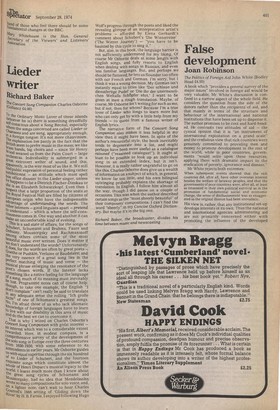Lieder Writer
Richard Baker
The Concert Song Companion Charles Osborne (Gollancz £4.00) To
the Ordinary Music Lover of these islands n(whoever he is) there is something dreadfully „.e,if-conscious about a Song Recital, especially "ere the songs concerned are called Lieder or °Ions ons and are sung, appropriately enough, 1.1`.1,a foreign tongue. It's not mere chauvinism. .e explanation lies partly in the fact that the rrnrish seem to prefer music in the mass; we like wass hands, big choirs and since Sir Henry „ °,0(1 weaned us from the Palm Court large "renestras. Individuality is submerged in a great extrovert welter of sound, and this, faPParently, is the way most of us like it. We still „`Inkxklibitionistd Public expression of personal feeling rather
✓ an attitude which must spell
i"1°X, office disaster to the Lieder singer, unless
nappens to be a Dietrich Fischer-Dieskau or !lie is an Elizabeth Schwarzkopf. Even then I
'd.11sPect that a large proportion of the seats at e Royal Festival Hall are filled by citizens of
• ropean origin who have the indispensable
aovantage of understanding the words. The other listeners good linguists apart pretend understand which is where the self-consclnosness comes in. One way and another it can Make an uncomfortable kind of evening. r, This is a sad state of affairs, for the songs of ;chubert, Schumann and Brahms, Faure and ebussY, Moussorgsky and Rachmaninoff
• nrig others contain some of• the most
ueautiful music ever written. Does it matter if e don't understand the words? Unfortunately Voes, for the words are often by great poets 0,13ethe or Pushkin, Verlaine or Baudelaire; and "e very essence of a great song lies in the Derr ec t matching of music and verse the L.ansical phrase enlarging the resonance of the ,.."et's chosen words. If the listener lacks nlething like a native feeling for the language i°31 a song, much of its meaning must inevitably
lost. Programme notes can of course help; rough, to take one example, the English "I
rill complain" can't really be said to translate 11. an, Y adequate sense the rolling "Ich grolle ii\lent" of one of Schumann's greatest songs. krt°, I'm afraid those of us who lack idiomatic
owledge of foreign languages have to learn live with our disability in this area of music and do the best we can to overcome it.
That is why 1 seized on Charles Osborne's Concert Song Companion with great interest an interest which was to a considerable extent rewarded. Here, in modest compass, is a ,CPmprehensive survey of the development of ule solo song in Europe over the three centuries 'rnrn 1650-1950, with some reference to its antecedents in earlier years. Mr Osborne guides 115 With equal expertise through the six hundred of so Lieder of Schubert, and the fourteen exquisite songs which constitute almost the Whole of Henri Duparc's musical legacy to the
World. 1 learnt much more than I knew about
_the great song cycles of Schumann and moussorgsky, had no idea that Mendelssohn wrote so many compositions for solo voice, and, °,-,r1 a lighter note, can't wait to hear Charles ' innunod's 1888 setting of 'Gliding down the iver' by H. B. Farnie. I enjoyed following Hugo
Wolf's progress through the poets and liked the revealing glimpse of an interpretative artist's problems afforded by Elena Gerhardt's comment about SChubert's Die Winterreise' ('The Winter Journey') — "you have to be haunted by this cycle to sing it." But, alas, in this book, the language barrier is not sufficiently undermined for my liking. Of course Mr Osborne deals at some length with English songs. and fully resorts to English when dealing with songs in Russian, and even less familiar languages. But, and perhaps we
should be flattered, he lets us flounder too often with our French and German. I'm sorry, but I
think it was a wrong decision. My German isn't instantly equal to titles like 'Der schlaue und dienstfertige Pudel' or 'Die ihr der unermesslichen Weltalls Scht5pfer ehrt.' I want to be " given at least a rough translation. Maybe, of course, Mr Osborne isn't writing for such as me, but if not, then for whom? Because I'm a true lover of Lieder who longs to learn more but who can only get by with a little help from my friends to quote from a famous writer of English lyrics. The narrative form of The Concert Song Companion also makes it less helpful in my view than it might have been. In spite of the author's resourceful style, the book inevitably tends to degenerate into a list, and might perhaps have been more useful as a catalogue
raisonee° ("reasoned cataloguer), It ought at least to be possible to Inok up an individual
song in an extended index, but it isn't. However, it is really rather ungrateful to go on like this. Charles Osborne does give us a wealth of information on a subject of which, in general, we know far too little, and his own bilingual upbringing probably explains the shortage of translation. In English, I follow him almost all the way, though 1 did pause on a couple of occasions. This was when the author described
certain songs as the "most sheerly beautiful" of their composers' compositions. I can't find the word "sheerly" in my Concise Oxford Dictionary. But maybe it's in the big one.
Richard Baker, the broadcaster, divides his time between music and newscasting


































 Previous page
Previous page